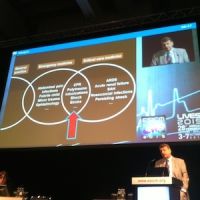Stanford Hospital has implemented an innovative "time-banking" programme intended to prevent burnout amongst its emergency room physicians. Its Department of Emergency Medicine now provides physicians with meals, housecleaning and an array of other services — babysitting, elder care, movie tickets, handyman services, speech training and more — as part of the programme to ease the work-life conflicts for the emergency medicine faculty.
Doctors can “bank” the time they spend doing the often-overlooked work of mentoring, serving on committees, covering colleagues’ shifts on short notice or deploying in emergencies. They earn credits which they can use for work or home-related services.
"This gives me more bandwidth at work," says Greg Gilbert, MD, an ER doctor at Stanford. "And because I can hang out with my kids and not be exhausted all the time, I'm able to be the kind of parent I'd always hoped to be."
Stanford's programme, part of a two-year, $250,000 pilot funded largely by the Sloan Foundation, has resulted in improvements in job satisfaction and work-life balance. Volunteering to cover shifts on short notice nearly doubled (to 83 percent) and people reported feeling more collegiality. Fewer postponed or avoided taking care of their health or put off vacation.
Also, for the first time, this year there are no openings for new fellows in the Department of Emergency Medicine. “All our spots have been retained,” Dr. Gilbert points out. “There’s been no turnover.”
Hannah Valantine, a cardiologist who led the pilot at Stanford, notes that work-life struggles are still often seen as a side issue in medicine. “The whole idea of addressing work-life fit as an important business case for excellence has not been bought into yet,” she says. “And I would argue that it should be right up there.”
Previous research shows that physicians, on average, work 10 hours more a week than other professionals, with nearly 40 percent working 60 hours or more. One in two physicians report at least one symptom of burnout and that they are twice as dissatisfied with their work-life balance than those in other professions, according to a 2012 study published in the Archives of Internal Medicine.
Like Stanford, a growing number of hospitals are seeking to change an unforgiving culture that has traditionally rewarded long work hours. Johns Hopkins Medical School has instituted physical and emotional wellness programmes for residents to prevent burnout, which has been linked to increased mistakes.
Stanford's time-banking programme is "brilliant and maintaining it was an easy decision,” says Paul Auerbach, former chief of emergency medicine, who explains that the credits cost “far less” than one percent of his budget. “It’s extremely cost-effective."
Source: The Washington Post
Image credit: Stanford Hospital
Doctors can “bank” the time they spend doing the often-overlooked work of mentoring, serving on committees, covering colleagues’ shifts on short notice or deploying in emergencies. They earn credits which they can use for work or home-related services.
"This gives me more bandwidth at work," says Greg Gilbert, MD, an ER doctor at Stanford. "And because I can hang out with my kids and not be exhausted all the time, I'm able to be the kind of parent I'd always hoped to be."
Stanford's programme, part of a two-year, $250,000 pilot funded largely by the Sloan Foundation, has resulted in improvements in job satisfaction and work-life balance. Volunteering to cover shifts on short notice nearly doubled (to 83 percent) and people reported feeling more collegiality. Fewer postponed or avoided taking care of their health or put off vacation.
Also, for the first time, this year there are no openings for new fellows in the Department of Emergency Medicine. “All our spots have been retained,” Dr. Gilbert points out. “There’s been no turnover.”
Hannah Valantine, a cardiologist who led the pilot at Stanford, notes that work-life struggles are still often seen as a side issue in medicine. “The whole idea of addressing work-life fit as an important business case for excellence has not been bought into yet,” she says. “And I would argue that it should be right up there.”
Previous research shows that physicians, on average, work 10 hours more a week than other professionals, with nearly 40 percent working 60 hours or more. One in two physicians report at least one symptom of burnout and that they are twice as dissatisfied with their work-life balance than those in other professions, according to a 2012 study published in the Archives of Internal Medicine.
Like Stanford, a growing number of hospitals are seeking to change an unforgiving culture that has traditionally rewarded long work hours. Johns Hopkins Medical School has instituted physical and emotional wellness programmes for residents to prevent burnout, which has been linked to increased mistakes.
Stanford's time-banking programme is "brilliant and maintaining it was an easy decision,” says Paul Auerbach, former chief of emergency medicine, who explains that the credits cost “far less” than one percent of his budget. “It’s extremely cost-effective."
Source: The Washington Post
Image credit: Stanford Hospital
Latest Articles
healthmanagement, emergency medicine, burnout, job satisfaction, work-life balance, wellness programme
Stanford Hospital has implemented an innovative "time-banking" programme intended to prevent burnout amongst its emergency room physicians.



























